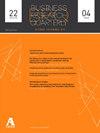The impact of SME leader’s psychological capital on strategic responses during crisis
IF 3.4
4区 管理学
Q2 BUSINESS
引用次数: 0
Abstract
This study investigates how the Psychological Capital (PsyCap) of small and medium enterprises (SME) leaders has influenced their strategic responses, ultimately impacting the performance of their companies, during the COVID-19 pandemic. Embedded within research on behavioral micro-foundations in strategy, and based on the resource-based theory (RBT) of the individual entrepreneur as well as positive organizational behavior literature, we hypothesize that SME leaders’ psychological resources can act as a strategic advantage during crises by making them adopt cost-cutting and investment measures for their companies performance. By using a sample of 372 SMEs, we find that while leaders mostly use both measures, leaders with a high PsyCap prefer adopting investment measures, which positively influences the performance of their companies during a crisis. However, adopting cost-cutting measures lowers performance. We contribute to the entrepreneurship literature by using PsyCap in the context of the RBT of the individual entrepreneur and shedding light on which measures sustain or increase SMEs’ performance during a crisis. JEL CLASSIFICATION: D91; L25; L26; M10危机中中小企业领导者心理资本对战略应对的影响
本研究调查了在2019冠状病毒病大流行期间,中小企业(SME)领导者的心理资本(PsyCap)如何影响其战略反应,并最终影响其公司绩效。在对战略行为微观基础的研究中,基于个体企业家的资源基础理论(RBT)和积极组织行为学文献,我们假设中小企业领导者的心理资源可以在危机中发挥战略优势,促使他们为公司绩效采取成本削减和投资措施。通过使用372家中小企业的样本,我们发现,虽然领导者大多使用这两种措施,但心理cap高的领导者更倾向于采用投资措施,这对公司在危机期间的绩效产生了积极影响。然而,采取削减成本的措施会降低绩效。我们通过在个体企业家的RBT背景下使用PsyCap,并阐明哪些措施在危机期间维持或提高中小企业的绩效,从而为创业文献做出贡献。凝胶分类:d91;L25;L26;M10
本文章由计算机程序翻译,如有差异,请以英文原文为准。
求助全文
约1分钟内获得全文
求助全文

 求助内容:
求助内容: 应助结果提醒方式:
应助结果提醒方式:


